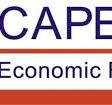….Task Fiscal, Monetary Authorities On FX Market Stability
Economists and researchers at CAPE Economic Research and Consulting firm have projected that Nigeria’s surging inflation will gradually begin to moderate from the third quarter this year towards more favourable levels in 2025.
The experts, in the firm’s ‘Economic Newsletter Vol 3 Issue 6 June 2024’ edition circulated to our correspondent, projected that inflation was expected to further heighten in May 2024, with headline, food and core inflation rising to 34.37, 41.58 and 27.54 percent respectively.
According to them, the principal drivers shaping the forecast for headline inflation persist in food prices, the exchange rate, housing, and utility costs, contributing 4.70 percent, 0.38 percent, and 0.31 percent, respectively.
The economists stated that the firm’s analysis underscored the significant impact of food prices, exchange rate fluctuations, and housing and utility expenses on headline inflation, as the aftermath of the energy price hike and exchange rate adjustments post-deregulation in June 2023 continue to reverberate throughout the economy.
They noted that these factors were anticipated to exert sustained inflationary pressure over the coming 12 months due to base effects, as core inflation was primarily being influenced by transportation costs, education expenses, clothing prices, housing and utility charges, and healthcare expenditures.
The researchers also identified the burgeoning fiscal deficit, the elimination of fuel subsidies, escalating exchange rate strains, and their subsequent pass-through effects on prices as responsible for the elevated risks to inflation in the country.
On the firm’s CPI trend over the next months, the economists predicted: “Our revised 12-month inflation outlook suggests a gradual moderation beginning in the third quarter of 2024, contingent upon prevailing conditions, with a trajectory towards more favourable levels by 2025. However, inherent risks to this projection include volatility in the exchange rate, security concerns, and policy uncertainties.”
This is even as they suggested that to bolster stability in the foreign exchange market, concerted efforts had become imperative, necessitating fiscal authorities to complement the Central Bank’s initiatives with measures aimed at attracting Foreign Direct Investment (FDI) and catalyzing exports, particularly in the oil sector initially, followed by other sectors.
They anticipated that the Monetary Policy Committee (MPC) of the Central Bank of Nigeria (CBN) would maintain its tight stance at its July 2024 meeting, either by holding the policy rate steady at 26.25 percent or marginally tightening it further.






